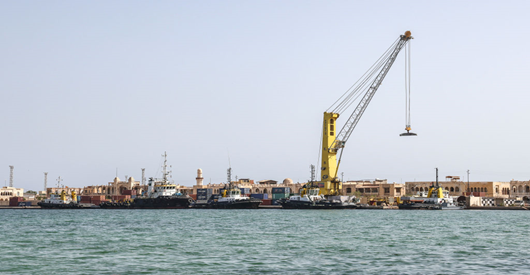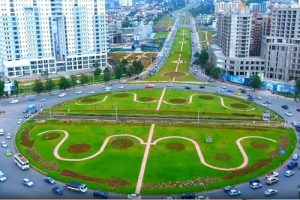
It is crucial to acknowledge Ethiopia’s strategic endeavor as it holds immense potential for long-term security and significant economic growth, not only for Ethiopia but for the entire region as well. By fully embracing Ethiopia’s aspiration for sea access, neighboring countries have the opportunity to cultivate an environment characterized by collaboration, mutual benefit, and shared progress.
This recognition acknowledges the importance of Ethiopia’s pursuit and its potential impact on both its own development and that of the surrounding nations.
Understanding Ethiopia’s strategic interest in seeking sea access creates a foundation of trust, cooperation, and collective advancement. It provides neighboring countries with a valuable opportunity to engage in constructive dialogue, establish mutually beneficial partnerships, and strengthen regional integration. This recognition of Ethiopia’s pursuit promotes a sense of shared purpose and aids in the formation of a more cohesive and interconnected regional community.
Perceiving Ethiopia’s pursuit of sea access as a potential source of sustainable security and economic growth allows neighboring countries to lay the groundwork for a more harmonious and interconnected regional landscape. By endorsing Ethiopia’s vision for sea access, collaborative efforts can be fostered to promote peace, stability, and shared prosperity among all nations in the region. This perspective facilitates the pooling of resources, leveraging of strengths, and enhancing the collective capacity for economic and social progress.
Recognizing Ethiopia’s quest for sea access as a means to bolster sustainable security and overall progress enables neighboring nations to align their own interests with those of Ethiopia. This alignment creates a harmonious environment conducive to collaborative endeavors and joint initiatives. The shared vision fosters a sense of common purpose and solidarity among nations, leading to the creation of a more stable and prosperous regional landscape.
By perceiving this pursuit as a potential source of sustainable security and economic growth, neighboring countries can lay the foundation for a more cohesive and interconnected regional community. Embracing Ethiopia’s vision for sea access paves the way for collaborative efforts aimed at promoting peace, stability, and shared prosperity among all nations in the region.
The country’s pursuit of sea and port access presents an opportunity for neighboring countries to partake in a shared vision of regional development and growth. By recognizing Ethiopia’s quest as a means to bolster sustainable security and overall progress, neighboring nations can align their own interests with those of Ethiopia, thereby creating a harmonious environment conducive to collaborative endeavors.
This shared vision can serve as a unifying force, fostering a sense of common purpose and solidarity among nations leading to the creation of a more stable and prosperous regional landscape.
By understanding and respecting Ethiopia’s strategic pursuits, neighboring nations can establish a framework for equitable cooperation, transparent communication, and inclusive decision-making. This level of understanding and mutual respect contributes to the strengthening of diplomatic ties, the resolution of potential conflicts, and the promotion of peaceful coexistence among nations in the region.
Ethiopia’s focus on port development extends beyond its own economic interests; it also acknowledges the importance of regional security. Stable economic growth creates a foundation for peace and prosperity. By investing in port infrastructure, Ethiopia aims to promote stability in the region, thereby safeguarding its own interests as well as those of its neighbors. A secure regional environment ensures smooth trade flows, discourages conflict, and establishes an atmosphere conducive to harmonious cooperation and shared prosperity.
The benefits of prioritizing port development extend beyond the economic and security realms. Ethiopia recognizes the potential for positive social impact that comes with increased connectivity and access to global markets. Robust port infrastructure promotes inclusivity by providing opportunities across various sectors, empowering women and youth, and reducing poverty levels.
As Ethiopia continues on its path towards economic advancement, it remains committed to inclusive development that considers the well-being of both its citizens and the wider region. By recognizing the critical role ports play in fostering economic growth, ensuring regional stability, and promoting social empowerment, Ethiopia is taking proactive steps towards realizing its vision of a prosperous and interconnected nation.
By regarding Ethiopia’s maritime aspirations positively, the neighboring countries can contribute to fostering stability and harmony in the area while simultaneously benefiting from the economic potential that sea access can bring. Ethiopia’s resolve to secure access to the sea should not be perceived as a source of concern by its neighboring countries; rather, it should be regarded as a potential avenue for fostering collaboration and shared prosperity through the effective utilization of maritime resources.
It is vital for neighboring nations to actively endorse and support Ethiopia in its endeavor to obtain sea access recognizing its potential to catalyze the reinforcement of regional cooperation and the establishment of stronger economic bonds.
The narrative surrounding Ethiopia’s quest for sea access presents an occasion for neighboring countries to transcend traditional perceptions and embrace a forward-looking perspective. Rather than considering Ethiopia’s aspirations as a threat, nations can reframe them as a pathway towards collaborative engagement and joint advancement. This shift in mindset encourages the exploration of innovative approaches to leveraging the region’s maritime resources for the collective benefit of all parties involved.
A secure and prosperous Ethiopia has the potential to ripple positive effects throughout its neighboring countries contributing to a more stable and conducive environment for socio-economic progress. Recognizing the intrinsic link between Ethiopia’s security and regional stability presents an imperative for neighboring nations to align their efforts in supporting Ethiopia’s pursuit of sea access viewing it as a vital element in the collective journey towards a more secure and flourishing regional landscape.
Embracing Ethiopia’s quest for sea access thus serves as a springboard for reinforcing the interconnectedness and interdependence of the region, paving the way for joint initiatives and synergistic endeavors aimed at yielding shared benefits for all stakeholders.
The strategic significance of Ethiopia’s pursuit of sea access extends beyond its own borders presenting an opportunity for neighboring nations to reframe their perspective and engage in constructive dialogue. Viewing Ethiopia’s ambition as a conduit for bolstering regional cooperation and economic interdependence opens avenues for nurturing a climate of trust, understanding, and joint commitment towards common goals.
Understanding Ethiopia’s determination to obtain sea access as a catalyst for strengthening regional cooperation highlights the potential for transformative change within the region. By embracing this pursuit as an opportunity for joint progress and mutual growth, neighboring nations can embark on a journey towards building a more cohesive and interconnected regional community.
This paradigm shift paves the way for the cultivation of cross-border partnerships, trade facilitation, and infrastructural development, creating a framework for sustained engagement and collaboration aimed at fostering a more resilient and integrated regional landscape. The recognition of Ethiopia’s pursuit of sea access as an opportunity for regional collaboration embodies a paradigm shift towards a future characterized by shared prosperity and mutual benefits.
Addis Ababa University Interim President, Samuel Kifle (PhD) told the Ethiopian News Agency (ENA) that Neighboring countries should view Ethiopia’s quest to access to sea as a means for sustainable security and robust economic development of the region. In an exclusive interview with ENA, Samuel said that Ethiopia’s quest for access to international sea and ports is a life-long question in its history, civilization, nation formation and state building.
Ethiopia’s economy is one of the largest in Africa and of course the first in east Africa, he said and added; “We have huge population and young population growing at fast rate; and this implies that we need to have a robust economic growth where ports play critical role not just for the economy but also for the sustainable security of the region.”
Rejection of the sea outlet affects Ethiopia’s economy and security, he stated, and pointed out that the issue is critical concept that intellectuals have to have a discussion on and do intellectual discourse explaining why Ethiopia is asking for port development. The Interim President emphasized Ethiopia’s access to the international sea fosters regional integration based on shared interests.
“Our quest is about equity, about fairness; about moral issue that we continue to supply fresh water to our brothers but our brother’s keep us away from ports is not a fair issue. They have to view it as a quest for a cooperative development, a quest for sustainable peace in the region, a quest for robust economic growth. This is a quest for justice as well and our brothers and sisters in neighboring countries have to view the question from this point of view,” Samuel elaborated.
People in Ethiopia share similar culture, language and faith with peoples in Eritrea, Djibouti, Somalia, Kenya, and Sudan, he said, and stressed; “But Ethiopia being the supplier of fresh water from all its rivers except Awash River is not getting any water from anyone else.”
Furthermore, the interim president pointed out that all Ethiopia’s rivers are crossing borders to sisterly countries even though it gets no drop of water that comes from Kenya, Djibouti, Somalia, Eritrea, Sudan or South Sudan.
BY ADDISALEM MULAT
THE ETHIOPIAN HERALD THURSDAY 28 DECEMBER 2023





